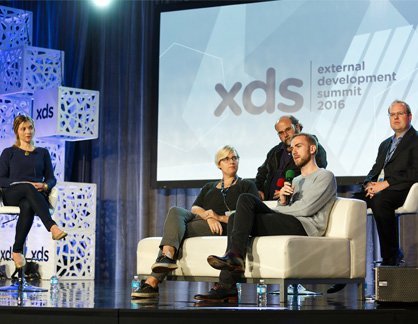We spoke to XDS 2016 Speaker, Lauren Freeman (Senior Manager on EA’s External Development Team), and asked her for some insight on External Development, how she got to where she is, the key takeaways from her presentation “Expert Panel: Virtual Reality’s Impact on External Development“, and more! We hope you enjoy the read, and don’t miss the video of her session at the end of this article!
1. Please provide some career history. What are the roles you’ve had working in games?
I started out my career as a game writer – working mostly on MMO, RPG and Facebook games (including EA’s Facebook RPG version of Dante’s Inferno). This led to content management which overtime, naturally led to managing both internal and external creative development pipelines and teams.
At Kabam, I was an art producer and external development manager, prior to becoming a program manager. In the latter role, I helped manage the greenlight and launch readiness process for games like Marvel: Contest of Champions and Fast & Furious: Legacy. This role gave me back stage passes to view the executive decision making processes involved in determining why games get made or don’t.
While my experience at Kabam was amazing, I decided I wanted a return to my roots. What I really enjoy is connecting talented teams around the world with one another. It’s very rewarding work.
2. Please describe your career experience with respect to external development (XD), and how your knowledge and influence has progressed in different roles.
It’s funny because I started my career early on as a talent agent managing motion picture, TV and voice over talent at a boutique agency in San Francisco (MDT Talent). It took me several years to understand how that job fit into game development and specifically, external development.
Sure, I learned a ton about contracts and negotiations which was relevant. But more importantly, I learned how to work with talent. External dev in a nutshell is about finding the right talent for a project or opportunity. My ultimate goal is always to find that perfect external team to support our internal teams. It has to be a match creatively, process-wise and philosophically. I think that managing talent as individuals was a necessary stepping stone for me to be able to manage talent at a company level.
As far as my career in gaming went, my role as a content manager was what got me started on this path. A strong game content pipeline requires all moving pieces to be working together towards a unified goal. I learned the many benefits of external development and the pitfalls to lookout for, by managing it first-hand for many years.
3. Please describe your current role and how it relates to XD.
I am fortunate to have found a centralized role here at EA, supporting many talented game teams worldwide.
I am senior manager on EA’s external development intelligence team. I support the following areas; EA Mobile, PC/Online, and emerging technologies. I have helped numerous game teams at EA find external partners for art, animation, engineering, audio, QA, UI-UX… the list grows each day.
4. What is the biggest obstacle XD poses for your team? How are you working to overcome this obstacle?
Every day is a new challenge. That’s what gets me up in the morning.
The gaming industry is one of the most dynamic industries in the world. I thought I wanted to work in film, until I got my first game job. New tech is constantly emerging, while existing tech converges, and older tech collapses. It’s amazing how cyclical it all is. And yet, it’s difficult to predict with any precision what the next innovation will be.
XDI has to predict the needs of our game teams at least 6 months in advance of when they’re going to ask for support. We have to be futurists and prospectors. That’s an awesome responsibility and one my team doesn’t take lightly.
How XDI handles this challenge is a bit of our secret sauce. Our team, led by Jason Harris, is doing some really innovative things here.
5. How many XDS events have you attended to date?
This year was my third XDS. I’m looking forward to many more.
Little known story, I was invited to a luncheon several years ago by a number of the yet-to-be XDS founding board members. The lunch was a brainstorm session of sorts where external development managers from various game companies were invited to discuss whether we thought there was an appetite for this sort of conference. Needless to say, there was!
6. How has XDS helped to provide insight into XD?
I talked a little about my team’s secret sauce above. XDS is a large part of how our team stays ahead of the industries needs and possible areas of support we should lookout for. The XDS industry reports and conference recaps are incredibly powerful tools for this purpose.
I hoard these reports in their very own email folder, so I can reference them easily. They are important enough to have their own email folder!
7. What are the key takeaways from the XDS 2016 “Expert Panel: Virtual Reality’s Impact on External Development” ?
This panel was a perfect example of how my job is really about finding the talent, providing them the platform to do what they do best, and then taking a step back to watch the magic happen. I was a moderator but I didn’t do much moderating at all. Instead, I found a group of talented people who share extensive knowledge on a topic that they love and MAGIC!
If I had to distill a key takeaway, it might be that you can’t just port an existing game to AR/VR platform and expect that it will work. It takes rethinking of everything from the ground up: game design, user interface, graphics, production pipelines, and audio – to build a game that players will love.


